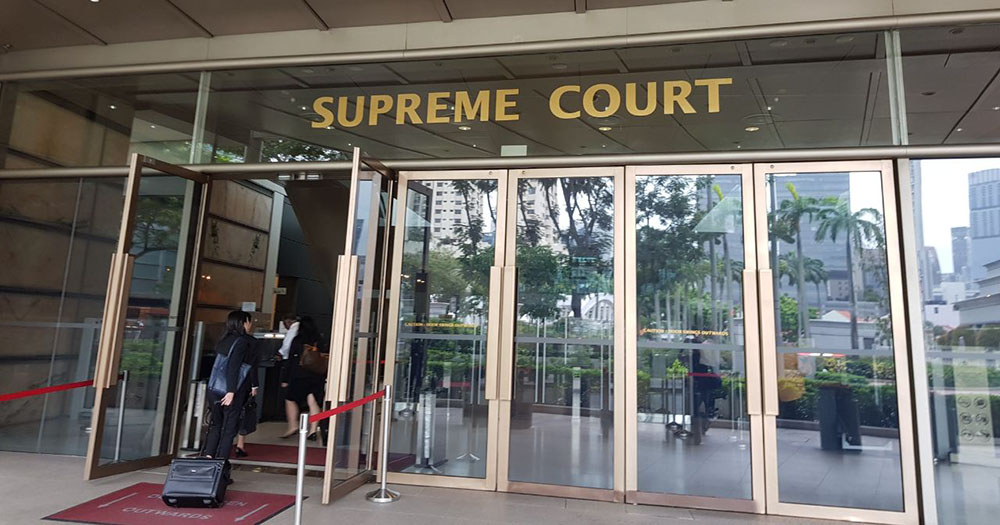The year 2020 will no doubt be remembered for many things, such as being an ignoble year where a number of well-loved businesses closed for good.
Sportslink and Bakerzin are just some of the local establishments that are no longer in operation after they accumulated sizeable debt and had to be closed down.
What happens to a company when it is closed down in this manner?
In short, a whole series of laws, rules and regulations kick in to make sure that things are resolved fairly.
As it's a fairly complex area of law, here's a simplified version of how things might go down, using bubble tea.
Imagine taking a walk in Tampines Central one evening when you pass one of its 2,739 bubble tea shops and overhear some disagreement.
The angry voices are a little muffled because of the masks, but you soon learn that the shop is closing soon, and is down to the last 10 cups of its Signature Roasted Passionfruit Vanilla Cheesecake Ice Cream Butterfly Pea Pandan Pudding Milk Marshmallow Tea Latte Macchiato.
The hubbub that you hear concerns the question of who should get these last 10 cups, as frazzled staff members try to fend off customers brandishing their receipts while delivery riders try to placate their customers who are threatening to give them one-star ratings.
You move in a little closer to kaypoh, and suddenly find yourself being asked to mediate between all the parties.
How will you distribute the bubble tea among the different parties?
- Customers in queue have paid for their drinks and have been waiting. Some desperately need their bubble tea fix, while others seek refunds.
- Delivery riders are anxious to move on to their next delivery.
- Previous customers, whose bubble tea came with pearls that they didn't order, are demanding a replacement drink.
- Bubble tea shop staff want the bubble tea for themselves, claiming that their boss has not paid them for their work.
- Bank representatives have also joined the fray, seeking repayment of an overdue loan.
As you can probably imagine, it would be quite difficult to find a way to make everyone happy in such a situation.
What happens when businesses close?
A rather similar situation to the example above may result when businesses go bankrupt (or, insolvent) and have to close down, in a process called compulsory liquidation.
Voluntary liquidation can be carried out by the company's owners, if it is not in debt. Alternatively, a company in debt may propose a voluntary winding up of the company and must notify its creditors. The creditors are able to appoint a liquidator.
In compulsory liquidation, however, there tends to be many competing claims, each of them valid. Thus, there is a need for a neutral third party to decide which claims are more important, and who should be paid first.
This third party, the liquidator, is a professional who must be licensed and registered with the Ministry of Law (MinLaw).
The liquidator's role is to, well, liquidate the assets of the company by seizing and selling them, and then distribute the proceeds fairly — in the eyes of the law, at least.
Priorities
Going back to the Tampines Central bubble tea shop, here's how you would apportion the last 10 cups, if you were acting as a liquidator in that scenario:
- First of all, take one cup for yourself. Why would you get involved otherwise? Likewise, the liquidator is entitled to the first cut of a company's assets, for costs and expenses.
- Give the staff what they are owed. Salary is to be paid first, followed by retrenchment benefits and other contractually-agreed sums, compensation for work injuries, contribution to CPF and similar schemes, and compensation owed because of unused annual leave, in that order of priority.
- Pay taxes to the government, provided that the tax was assessed before the company ended up in its dire straits.
- Pay any others who are owed, including other companies and individuals.
Equal footing, or "pari passu"
A commonly-mentioned term in insolvency law is that debtors in a given category must be paid "pari passu", a Latin term meaning "on equal footing". This applies to paying debts as well as compensating shareholders.
Paying back debts
This means that, if there isn't enough to pay back all the debts in full, a liquidator has to distribute the remaining assets to creditors in proportion to the amount they are owed.
This means that every customer or delivery rider might only walk away with 50ml of bubble tea for every cup that they were supposed to get from the shop.
While this may seem unjust, it is in fact fair to all involved, in the sense that they will all be equally miserable (and thirsty).
Compensation for shareholders
Shareholders typically invest in a company by buying shares. This allows them to partake in its profits through shareholder dividends, and if they have a significant stake, to have some control over the company.
In insolvency, they may receive a "refund" on their investments, if there are assets remaining after the company's debts are paid.
However, it is more likely than not that an insolvent company's shareholders will receive no refund, or at best, only a partial refund.
After all, if there were enough assets to pay back the company's debts, and to compensate shareholders, it might not be getting into insolvency in the first place.
Any such payments to the shareholders is also done "pari passu".
Who's in charge of the insolvency process?
The insolvency process is overseen by the courts, whose judges have experience in dealing with competing claims.
Judges may be called upon by creditors or shareholders, to resolve disputes over how the liquidator has acted.
 Photo by Matthias Ang.
Photo by Matthias Ang.
The liquidator may also rely on the authority of the courts to enforce certain tricky decisions.
And things can get tricky when a company is facing liquidation, especially if there was wrongdoing committed, or unfair decisions made by the company directors leading to its liquidation.
In such cases, the court might be called upon to take action to ensure fairness. Some examples of this include:
Undoing undervalued transactions
If the liquidator discovers that certain sales or dealings, in the lead-up to liquidation, were completely bad bargains, the court might be called upon to undo those transactions.
This would include transactions done with a hidden agenda that do not benefit the company — for example, if the boss had arranged for bubble tea to be delivered to his wife's company every month for free, or at a steep discount.
The court in this case might undo the transaction by ordering the wife's company to pay up the balance. The money can then be used to repay employees, creditors, and shareholders.
However, if there is "good faith" behind the transaction, it will not be undone.
For example, the discount could have been offered to other companies as well, as part of a promotion to drive up sales.
Correcting unfair preference
If the liquidator discovers that certain creditors were unfairly prioritised, in the lead-up to the liquidation, the court might be called upon to undo those payments as well.
For example, if the boss of the company knew that the company was likely to go bust, and hurries to repay debts that the company owed to his family members, the repayments would be considered "unfair preference" as they leave less for the other creditors.
The court has the authority to undo such payments, provided certain other conditions are fulfilled.
"Bosses" tend to walk away, except...
There may be cases of insolvency where hardworking employees are left jobless and unpaid, while other companies that are owed sums of money also go unpaid.
However, if there is no fraud or criminal wrongdoing, the bosses of a company could walk away from insolvency without needing to take personal responsibility for these debts.
This is because a company is regarded as a "separate legal entity" from associated individuals (such as owners or managers), a concept recognised by the law in Singapore and many other countries.
While separate legal entity means that a company's directors might appear to "get away" easily from the company's debts, this legal concept also prevents them from indiscriminately using company assets to pay their own personal debts.
Therefore, in cases where the company was simply unlucky, or unprofitable, the company directors would be able to move on and try again with another business endeavour.
There are, of course, exceptions to this.
When may directors be held personally accountable for company debts?
There are also situations where directors might be asked to pay up for the debts of an insolvent company.
One prime example would be when those debts were incurred due to fraud or criminal wrongdoing on the part of the director.
Imagine being sold a stack of bubble tea discount vouchers expiring in one year's time. And, imagine this fraudulent scheme was devised by a group of directors who knew the company would be closed down soon.
In such a case, it would be unfair for the company (and its employees, creditors, and shareholders) to bear the consequences.
Thus, the law provides that the directors can be required to compensate the voucher holders out of their own pocket.
Directors can also be fined and jailed if they are found guilty of such acts, of course.
Disqualification of directors
Directors who were involved in a company that goes insolvent could also face other consequences, besides responsibility for company debts — they could also be disqualified from being directors of other companies.
For example, the courts have discretion to disqualify directors who are involved in a single company's insolvency, if their conduct in (mis)managing the company makes them "unfit".
In such a case, the court would consider the extent of that director's responsibility for the company becoming insolvent, any failure on their part in performing their duties, and whether their industry was more prone to business risks, among other factors.
Another example would be "repeat offender" directors who have three or more defunct companies struck off the register within five years will be disallowed from being a director of another company for a period of five years.
They are also prohibited from taking part in the management of any company, as a director or otherwise.
We deliver more stories to you on LinkedIn
Mothership Explains is a series where we dig deep into the important, interesting, and confusing going-ons in our world and try to, well, explain them.
This series aims to provide in-depth, easy-to-understand explanations to keep our readers up to date on not just what is going on in the world, but also the "why's".
Top image via Pixabay and Kim Cruz on Pexels
If you like what you read, follow us on Facebook, Instagram, Twitter and Telegram to get the latest updates.
